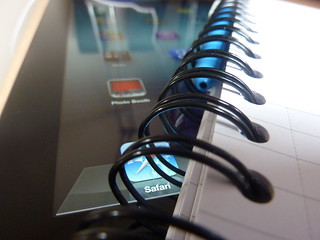I could be here focusing on the interesting ideas that I learned from presenters in the TESOL Conference 2014, but by having the snapshots, quick notes I took during some sessions, you might come across interesting references, links and people that will inspire you.
Some topics that caught my attention:
Many Intersections Sessions that I attended focused on Mobile Learning. It is noticeable that though we all work in different contexts, the challenges are very similar, lack of infrastructure, difficulties with bandwidth in an ipad rollout program. Teacher training is also in the agenda of every Institution who wants to have a successful program. In my notes, I added some apps and resources that were mentioned. One thing that I missed was more presentations on learning outcomes with a more intensive use of mobile devices. Any qualitative and quantitative differences in the results of students who have been using smartphones/tablets and the ones who are not?
Marsha Chan, in her presentation on how to help students improve their oral communication skills, suggested using Youtube Playlists to help students find relevant content for further practice. At the end of my notes, you can find Marsha´s notes with all the links she mentioned.
Nick Robinson´s advice and thoughts on the future of ELT publishing really got me hooked. Many interesting points about possibilities for self-publishing and concrete examples already in the market. I had the pleasure to meet Andy Boon (thanks to Nicky Hockly!), one of the authors in a self-publishing/independent project. We were immediately hooked to the story and downloaded the multi-pathways stories available in Kindle. You can learn more about those great interactive stories at http://atama-ii.com . Learn more about Nick Robinson´s ideas at http://www.eltjam.com/ and https://twitter.com/nmkrobinson
Another excellent presentation that got me with an irresistible thirst for more was one on gamification by Josh Wilson, who focused on the game-like mentality for educators to prepare better, more engaging lessons. Josh´s presentation was much more focused on the strategies and mechanics that we can learn from a game designer mindset to make our students learn in a more enjoyable way, not in the aspects that many consider as the core of a gamified lesson, points and badges. Not at all. Josh consistently mentioned that these are just part of the sum. Here are some key concepts:
Design the experience
Quantify everything (score; progress)
give choices
External pressure
Constant feedback
Design the context
Imagine your learners as players
In fact, this is an area that I´ve been consistently studying, and two resources that you might want to check, a Google Talk, Smart Gamification: Designing the Player Journey with expert Amy Jo Kim
Also, the book "The Gamification of Learning and Instruction" by Karl Kapp
Another presentation that was very useful, highly intense in terms of ed tech resources we can use in our classrooms was Lea Sobocan´s digital tools session. I´ve just checked her scoop it, which is a true gem: http://www.scoop.it/t/tech-gems-for-teachers
I could go on and on with my highlights of TESOL 2014, but I´m sure you´ll find your own treasures by exploring my Evernote notes with some great presentations I had the chance to attend. I´d love to know what you found.
Crossposted at http://carlaarena.com/tesol-2014-snapshots




